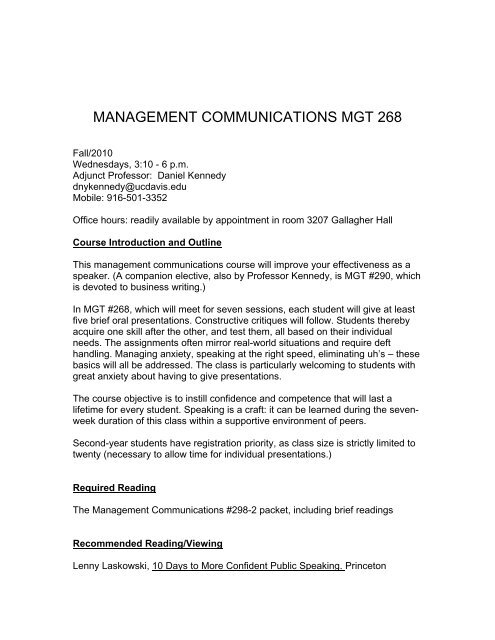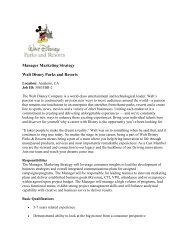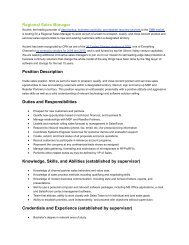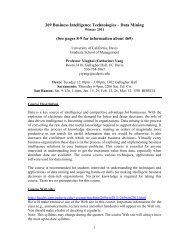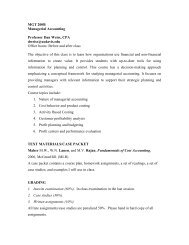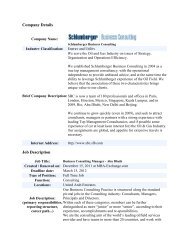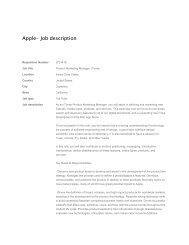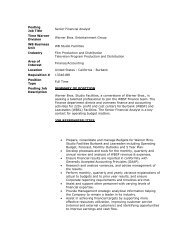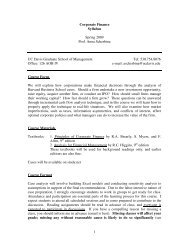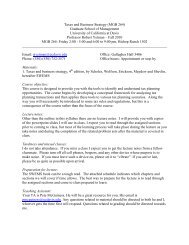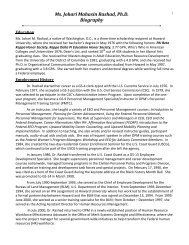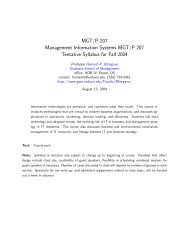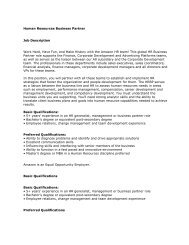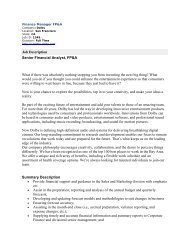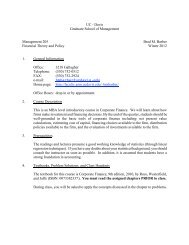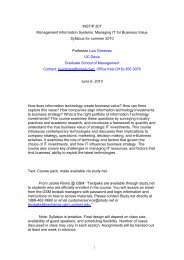MANAGEMENT COMMUNICATIONS MGT 268 - Students - UC Davis
MANAGEMENT COMMUNICATIONS MGT 268 - Students - UC Davis
MANAGEMENT COMMUNICATIONS MGT 268 - Students - UC Davis
Create successful ePaper yourself
Turn your PDF publications into a flip-book with our unique Google optimized e-Paper software.
<strong>MANAGEMENT</strong> <strong>COMMUNICATIONS</strong> <strong>MGT</strong> <strong>268</strong><br />
Fall/2010<br />
Wednesdays, 3:10 - 6 p.m.<br />
Adjunct Professor: Daniel Kennedy<br />
dnykennedy@ucdavis.edu<br />
Mobile: 916-501-3352<br />
Office hours: readily available by appointment in room 3207 Gallagher Hall<br />
Course Introduction and Outline<br />
This management communications course will improve your effectiveness as a<br />
speaker. (A companion elective, also by Professor Kennedy, is <strong>MGT</strong> #290, which<br />
is devoted to business writing.)<br />
In <strong>MGT</strong> #<strong>268</strong>, which will meet for seven sessions, each student will give at least<br />
five brief oral presentations. Constructive critiques will follow. <strong>Students</strong> thereby<br />
acquire one skill after the other, and test them, all based on their individual<br />
needs. The assignments often mirror real-world situations and require deft<br />
handling. Managing anxiety, speaking at the right speed, eliminating uh’s – these<br />
basics will all be addressed. The class is particularly welcoming to students with<br />
great anxiety about having to give presentations.<br />
The course objective is to instill confidence and competence that will last a<br />
lifetime for every student. Speaking is a craft: it can be learned during the sevenweek<br />
duration of this class within a supportive environment of peers.<br />
Second-year students have registration priority, as class size is strictly limited to<br />
twenty (necessary to allow time for individual presentations.)<br />
Required Reading<br />
The Management Communications #298-2 packet, including brief readings<br />
Recommended Reading/Viewing<br />
Lenny Laskowski, 10 Days to More Confident Public Speaking. Princeton
Language Institute, Grand Central Publishing, 2001<br />
James C. Humes. Speak Like Churchill, Stand Like Lincoln. Prime Publishing,<br />
2002.<br />
Janet E. Esposito, Overcome Your Fear of Public Speaking and Performing. In<br />
The Spotlight, 2003.<br />
Pamela Angell. Business Communication Design. McGraw Hill Irwin. 2004 (sic).<br />
This is a great overall textbook on all aspects of the subject.<br />
Also, to view and learn from quality presentations by noted speakers, with and<br />
without accompanying visuals, go to<br />
http://www.ted.com/index.php/talks.<br />
Evaluation and Grading<br />
Class participation: 15%<br />
Speaking assignments: 85%<br />
Important notes: What is “participation?” It’s attendance, first of all, because this<br />
is a hands-on workshop environment. It’s also active participation in the<br />
discussions and critiques. All assignments benefit from being rehearsed with<br />
others, especially students in the class.<br />
Code of Ethics Disclosure<br />
All students who take this course are governed by the University of California's<br />
standards of ethical conduct for students, in particular, the sections on academic<br />
conduct and integrity. These sections set forth the responsibilities of students<br />
and faculty to maintain a spirit of academic honesty and integrity at U. C. <strong>Davis</strong>.<br />
It is essential that you are aware of this code of conduct and the disciplinary<br />
actions that may be taken in the event of a violation. Details may be obtained<br />
from the GSM Associate Dean or the Office of Judicial Affairs.<br />
<strong>Students</strong> in this class should abide by the course-specific policies regarding<br />
participation, collaboration, and reliance on the work of others, as spelled out<br />
earlier in this syllabus and by the instructor in class.<br />
Schedule<br />
Starting in the second class, oral presentations will be recorded for your<br />
personal viewing outside of class in order to enhance learning.
1 st class: Learn the importance of skilled management communications, and<br />
receive an introduction to the craft of making a presentation. Also, each student<br />
makes a 90-second oral presentation. “If I were (a person of tremendous<br />
influence, with the ability to reshape something about business), I would<br />
change….” (you might choose a subject tied to OB, HR, philanthropic activity, the<br />
capital markets, green manufacturing, advertising, etc.)<br />
2 nd class: Each student makes a 3-minute oral presentation, advocating a<br />
change in the realm of healthcare in the U.S. or elsewhere in the world. Imagine<br />
that your audience consists of people in the healthcare industry – physicians,<br />
nurses, hospital administrators, executives in healthcare insurance, healthcare<br />
policy leaders, and the like.<br />
3 rd class: Ten students make 3-minute oral presentations. The assignment is to<br />
tell us about a key incident or person in your life that has had a major influence<br />
on your business aspirations. This taps a student’s story-telling skills. This will<br />
take 90 minutes; the professor will lecture during the remaining time.<br />
4 th class: The remaining ten students make their presentations on the topic from<br />
last week. Professor teaches skills in the balance of the period.<br />
5 th class: Each student makes a 3-minute persuasive presentation, incorporating<br />
one or more props (visual elements other than PowerPoint).<br />
6 th class and 7 th class: During classes six and seven, students will give inspiring<br />
presentations drawn from personal experience. These presentations will include<br />
elements of wit, which will be explained beforehand. Additionally, the professor<br />
will lecture and demonstrate the correct uses of PowerPoint and other skills.<br />
There will be no final exam.


